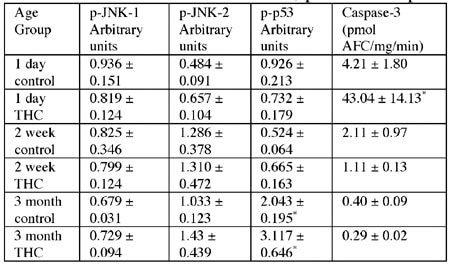Δ9-Tetrahydrocannabinol (THC), the psychoactive ingredient of marijuana, induces apoptosis in neurons prepared from neonatal rats (Downer et al. 2001) but not in adult neurons in vivo (Galve-Roperh et al. 2000). Our study aimed to examine the influence of post-natal development on the ability of THC to activate components of the apoptotic cascade (c-Jun N-terminal kinase (JNK), p53 and caspase-3) in the cortex.
Cortical slices (250 µm thickness) were prepared from humanely killed 1-day-old, 2-week-old and 3-month-old male Wistar rats and incubated with THC (5 µM) ± the CB1 antagonist, AM-251 (10 µM), for 2 h at 37 °C in Hepes-buffered physiological saline. The activities of JNK and p53 were assessed by Western immunoblot using anti-phospho-JNKThr-183 Tyr-185 and anti-phospho-p53Ser15 antibodies. Caspase-3 activity was assessed by analysis of the rate of cleavage of the fluorescent DEVD-AFC substrate peptide.
In slices prepared from 1-day-old rats the stimulatory effect of THC on caspase-3 (Table 1) was abolished by AM-251 (caspase-3 activity was 4.05 ± 1.17 pmol AFC mg-1 min-1 in cells treated with THC + AM-251).
Thus, p-p53 expression was significantly increased in the cortex of 3-month old rats, although THC failed to modulate the activities of JNK1/2 or p53 in any of the age groups. However, the proclivity of THC to activate caspase-3, via the CB1 receptor, was only observed in the neonatal cortex. This result suggests that the immature cortex may be more susceptible to the apoptotic effects of THC.
This work was supported by the Health Research Board, Ireland.

